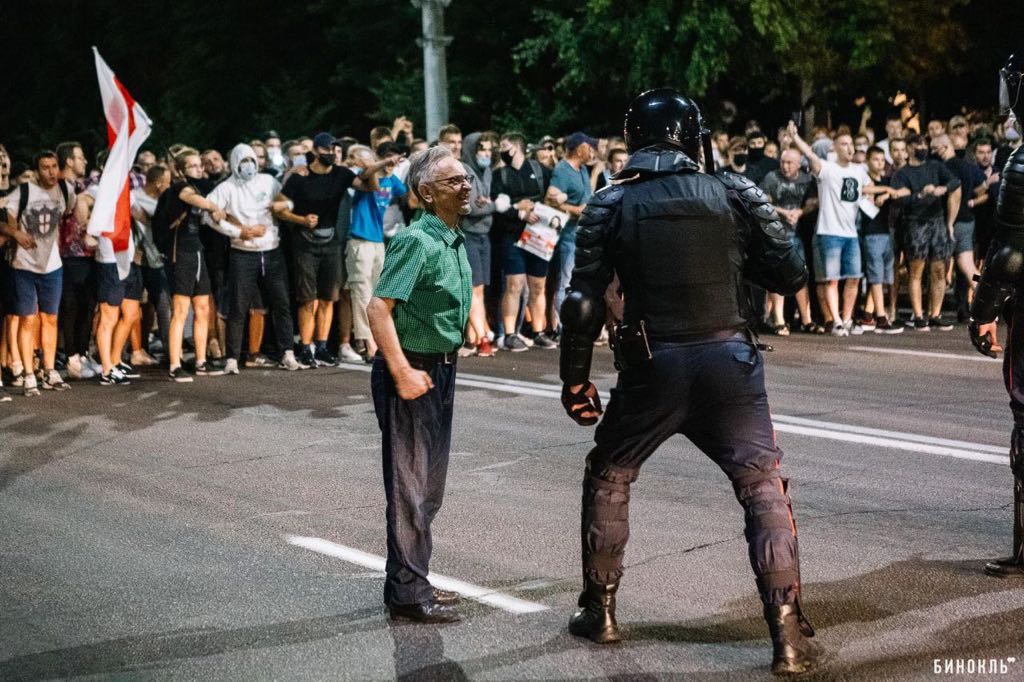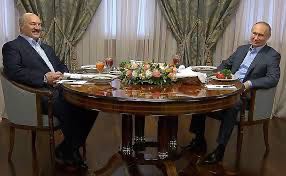Both Russia and the West may be sick and tired of the mercurial Belarusian autocrat, but up till now they still saw him as the lesser evil, writes Maxim Samorukov of Carnegie Moscow. Outdated regimes can prove extremely resilient if favored by broader geopolitics.

Election-night in Brest (Belarus). Picture from Twitter. (c) Vinokl.
By Maxim Samorukov
Just a few months ago, Belarus’s presidential election looked set to be dull and predictable. Today, many see the August 9 vote as a potentially fatal blow to the regime of Alexander Lukashenko, who is fighting for his sixth consecutive term in power.
Besieged by external and domestic strife, the longtime Belarusian leader seems to have nowhere to turn. The EU condemns his maltreatment of political opponents and is considering reimposing sanctions, which would ruin the country’s nascent rapprochement with the West. Russia, for years Lukashenko’s dependable ally, stands accused by Minsk of sending over mercenaries from the notorious Wagner group to topple the Belarusian leader as punishment for his increasingly independent foreign policy. Meanwhile, the country is engulfed by nationwide protests, with an unprecedented 60,000 people attending a recent opposition rally in Minsk.
Erratic behavior and regime fundamentals
Lukashenko’s erratic behavior and inconsistent pronouncements create the impression that his regime is on its last legs. Yet his apparent panic is likely to prove misleading. Lukashenko is prone to losing his nerve and overreacting to opposition challenges every time he has to hold an election. It doesn’t affect the fundamentals of his regime, which are still sound. Both Russia and the West may be sick and tired of the mercurial Belarusian autocrat, but they still see him as the lesser evil, while the domestic opposition has little chance that a split in the ruling elite would help it convert popular discontent into change at the top.
Lukashenko is infamous for his parochial approach to foreign policy, and has time and again vexed his partners to both east and west. Still, his instincts and luck have kept him afloat, as both Russia and the West believe the risks from his downfall would outweigh the benefits.
Lessons learned in Ukraine
The Ukraine crisis has made the West more tolerant of the authoritarian excesses of Lukashenko, who is seen as the best available guarantor of Belarus’s sovereignty. The country’s cautious and gradually expanding engagement with the EU and the United States appears a safer option than abrupt regime change, which could provoke Russia to intervene.
Lukashenko fanned the flames of such fears during the election campaign, making more accusations of interference against Russia than the West, the usual subject of such claims by the Belarusian leader. Unless the president resorts to egregious repressions against the opposition, the election is unlikely to trigger a new wave of Western sanctions. The West’s concerns over vote-rigging and the imprisonment of opposition activists are overridden by the desire to preserve the hard-won progress in relations, however modest.
Russia would be glad to see Lukashenko snap under the strain of the election campaign and burn his bridges with the West. But talk of the Kremlin plotting to overthrow the Belarusian leader is far-fetched. Russia’s overriding priority in Belarus is to forestall the country’s integration with the West, and the toxic figure of Lukashenko is the best possible obstacle to that process.
During the elections, opposition candidates may have adopted a friendly stance on Russia and avoided pro-Western rhetoric, but this means little in the eyes of the Kremlin. It is clear that any Belarusian president other than Lukashenko would have better chances of diversifying the country’s international ties, no matter how strongly pro-Russian their views before coming to power.
Out of six post-Soviet states in the EU-Russia common neighborhood, Belarus remains the only one not mired in a territorial conflict. Yet the personality of Lukashenko—with his dire reputation in the West and irremediable Soviet outlook—performs a similar function of a conflict, in that it precludes the country’s integration with the EU and NATO. Just as the European aspirations of Armenia, for example, are hamstrung by the Nagorno-Karabakh conflict, those of Belarus are made impossible by Lukashenko.

Lukashenko and Putin. Picture Kremlin
Safe as long as elite and siloviki don’t switch sides
Without external support, the Belarusian opposition is unlikely to muster enough resources to dislodge Lukashenko. Street protests can hardly overthrow an incumbent autocrat without the support of a part of the elite and security services, which is missing in Belarus. Unlike Ukraine, Moldova, and Georgia, Belarus lacks powerful oligarchs who possess the financial and media capacity to challenge the country’s leader. When fired by the president, Belarusian high-ranking officials do not establish their own political parties or organize protest movements to blackmail their way back to power. Instead, they feel relieved if Lukashenko allows them to quit state service peacefully, instead of sending them to jail or to run a remote, loss-making state farm.
Belarus’s rival security structures spare no effort in spying on one another, but have never given grounds to doubt their loyalty to Lukashenko. Even in the lean times of the mid-1990s, they respected the chain of command and forcibly ejected dozens of MPs from the parliament building on presidential orders. There is no reason to expect them to act differently now, when they have become one of the most privileged and affluent groups of Belarusian society.
Political demands without nationalistic rhetoric
Finally, the Belarusian protests have more in common with Russia’s anti-Putin rallies in 2011–2012 than with Ukraine’s Maidan revolution that led to regime change in 2014. With his relatively generous social programs, Lukashenko still commands substantial support in rural areas and among the older generation, while the opposition movement is dominated by young professionals and the urban middle class. Their grievances are mainly political, with social issues taking a back seat.
Strong nationalist rhetoric of the kind that proved crucial to mass mobilization in revolutions in Ukraine and Georgia plays only a marginal role in the Belarusian protests and society in general. The anti-Lukashenko movement is well-intended, but dithering and easy to suppress. A few show trials resulting in short prison terms will suffice to make the majority of protesters have second thoughts and return to their everyday life, which is basically European in all but political freedoms.
Still saved by geopolitics
Belarusian society has clearly outgrown its veteran populist leader. A country with a burgeoning tech sector and the highest number per capita of European Schengen area visas needs a more complex and responsive political system than Lukashenko can ever provide. But this does not guarantee imminent change.
Outdated regimes can prove extremely resilient if favored by broader geopolitics. The quasi-fascist dictatorships of southern Europe already looked obsolete in the years immediately following World War II, but remained in place for another three decades until the threat of a communist takeover subsided. The same may prove true for Lukashenko, who, from his position atop a geopolitical fault line, will weather every storm as long as Russia and the West mistrust him less than they do each other.
Maxim Samorukov is a fellow at the Carnegie Moscow Center and deputy editor of Carnegie.ru. Before 2015, Samorukov worked for the independent news website Slon.ru for five years. This material is part of the “Russia-EU: Promoting Informed Dialogue” project supported by the EU Delegation to Russia.
This article was originaly published at Carnegie Moscow.
